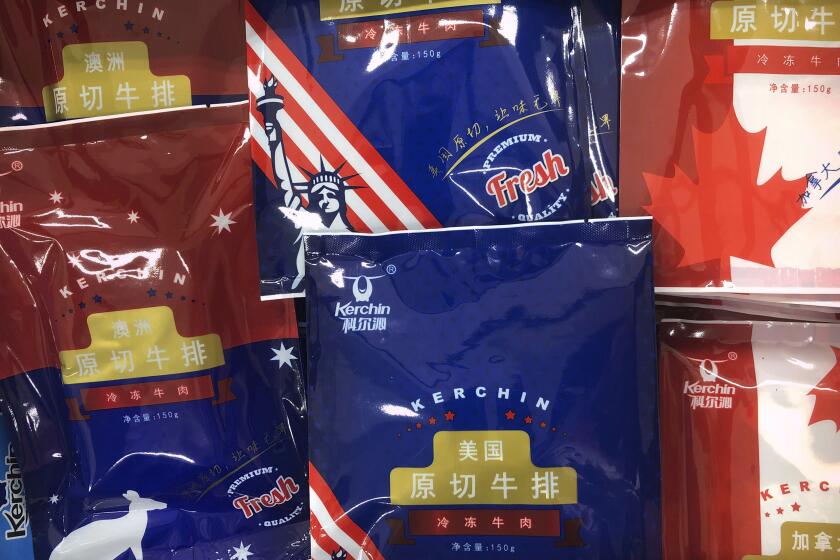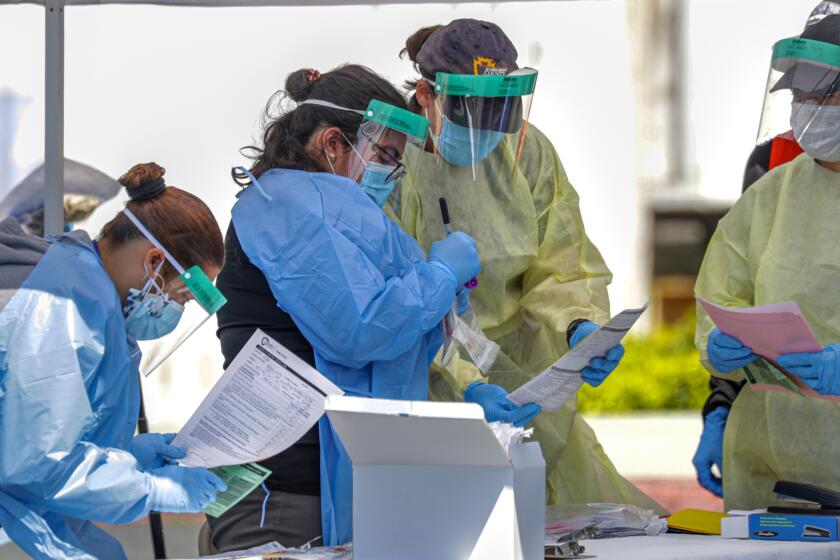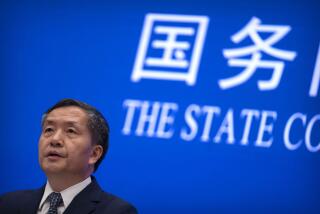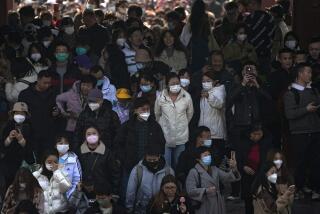At coronavirus-dominated WHO meeting, U.S. is combative as China takes diplomatic tack
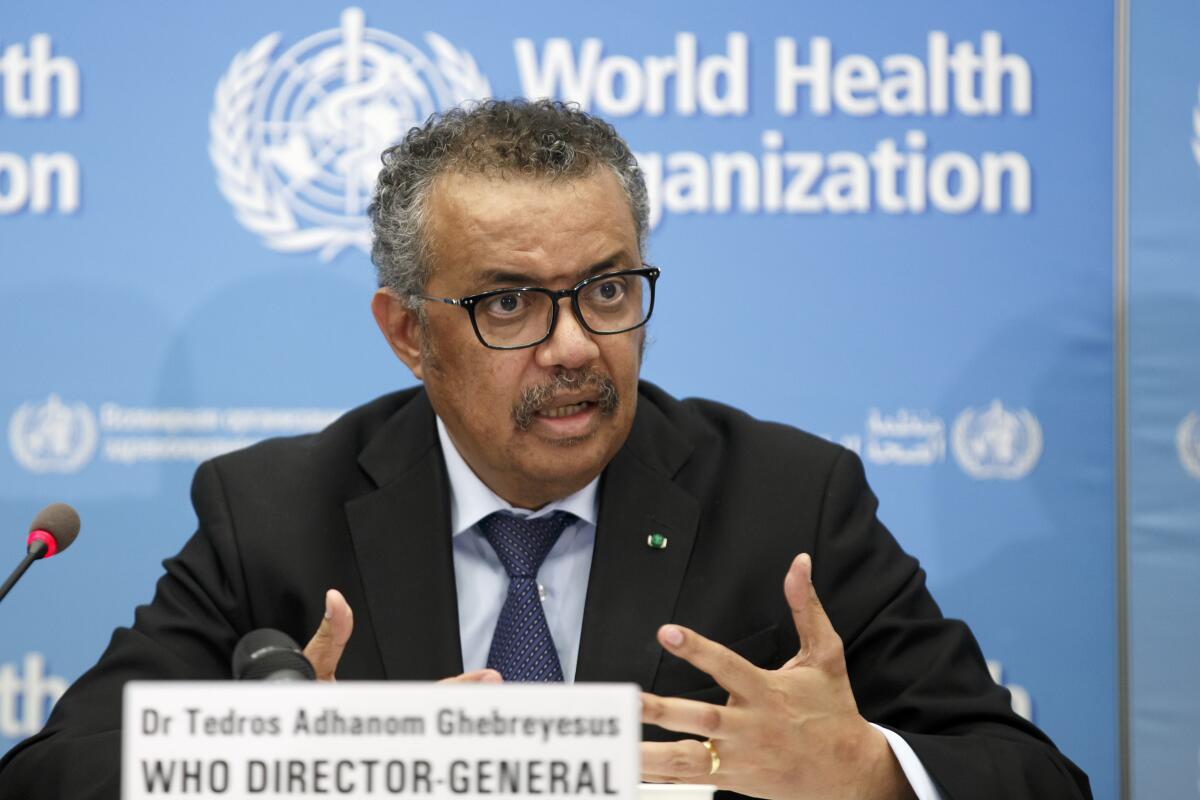
Beijing and Washington faced off Monday at a virtual worldwide health gathering, with Chinese President Xi Jinping announcing a $2-billion contribution to fight the coronavirus and urging solidarity with the World Health Organization in battling a pandemic that has claimed more than 316,000 lives across the globe and devastated many countries’ economies.
The United States, by contrast, renewed bitter accusations against the U.N.’s health agency and jabbed at it and China over secrecy in the crucial weeks following the virus’ emergence in the central city of Wuhan. Health and Human Services Secretary Alex Azar, speaking by video link, declared that the WHO had “failed at its core mission of information-sharing and transparency” in confronting the outbreak.
“Although we are all focused on the immediate response, we need a more effective WHO — right now,” Azar told a meeting of the World Health Assembly, the WHO’s decision-making body.
China has suspended beef imports from four Australian producers in an escalating political spat between the two countries over the coronavirus crisis.
The United States was largely isolated in its excoriation of the WHO, with the governments of France, Germany and South Korea expressing support for the organization. At the urging of the European Union and others, however, the WHO agreed to an independent review of its coronavirus response, to be launched at the “earliest appropriate moment.”
U.S. relations with allies have been contentious in the course of the outbreak, and in some cases, China has moved to fill the void.
In March, Trump failed to give European leaders a heads-up before announcing sweeping travel restrictions on the 27-nation EU. Earlier this month, the Trump administration was conspicuously absent from a high-profile European-led online conference on developing vaccines and soliciting pledges to fight the pandemic’s effects.
The bowing of the WHO to calls for a review of its actions came after an oversight body raised questions about the organization’s procedures for alerting the world to outbreaks including this one, and about the decision-making on travel advice the organization provides at such times.
But the review will not address the origins of the novel coronavirus, which the Trump administration has placed at the center of its scathing criticism of both the health body and China. The U.S. president has advanced the theory — unsupported by any publicly disclosed intelligence or scientific findings — that the coronavirus originated at a lab in China.
Virology experts generally believe the virus likely jumped from animal to human.
The coronavirus, and Trump’s ire, draw increased attention to the World Health Organization.
China supports the independent review of WHO. It would presumably touch on some of China’s own early actions, although Xi said the evaluation should wait until the immediate crisis subsided. He said any evaluation should be based on “science and professionalism” and “conducted in an objective and impartial manner.”
The conciliatory tone of Xi’s remarks, coupled with China’s announcement of a financial contribution at a time when the U.S. has temporarily cut its own support for the WHO, was the latest example of China seeking the leadership mantle amid the crisis, despite being the country where the outbreak started.
Azar, echoing a prime White House talking point, cast blame on Beijing, though without naming China. He said at least “one member state made a mockery of their transparency obligations, with tremendous costs for the entire world.”
Xi defended China’s early actions, saying it had moved in a “timely fashion” to provide information, including the virus’ genetic sequence, to the WHO and other parties. China’s $2-billion contribution to fighting the virus and the economic wreckage it has wrought, especially in developing countries, will be provided over two years, he said.
WHO’s head, Tedros Adhanom Ghebreyesus, said he welcomed the review but characterized the U.N. body’s tracking of the outbreak’s course as appropriate. The organization declared a global health emergency Jan. 30, in the outbreak’s early stages, and designated it a pandemic on March 11.
Addressing the gathering from Geneva, Tedros bemoaned the divisions between countries exacerbated by the coronavirus crisis but said there had also been heartening shows of unity.
He acknowledging that “geopolitical divisions have been thrown into sharp relief” but said “nations have come together as never before.”
Xi’s support for the independent review represented something of a softening of China’s angry insistence that there was nothing untoward about its own actions in the early stages of the virus’ explosive spread.
Beijing’s reputation would likely suffer if it sought to block the evaluation outright. However, China could do as it did when WHO experts were allowed into the country to look into the outbreak, controlling access to key locales and witnesses.
China’s contribution to the WHO, about $86 million last year, has traditionally been dwarfed by that of the U.S. Trump announced last month that his administration would suspend its contribution to the organization, which amounts to about $550 million annually, via various programs.
More to Read
Sign up for Essential California
The most important California stories and recommendations in your inbox every morning.
You may occasionally receive promotional content from the Los Angeles Times.
